Programs Offered
B.Tech. (Computer Science & Engineering (AI & ML))
Intake – 180
Core Competencies
- Data Sciences
- Machine Learning
- Image Processing
- IOT
- FOSSEE
Vision
To emerge as a distinguished department, fostering skilled AI developers through top-notch education, interdisciplinary collaboration, industry readiness, and impactful research for the betterment of society.
Mission
- Offer excellent training using creative AI concepts and technologies.
- Shape students into skilled and responsible professionals.
- Teach ethics, values, leadership, and teamwork for real-world challenges.
- Lead in AI education and research by creating centers of excellence.
About CSE(AI&ML) Department
Overview
Established in 2022, the Computer Science and Engineering (AI & ML) Department commenced with an initial intake of 60 students, which has since burgeoned to 180. The department offers a comprehensive program in Artificial Intelligence & Machine Learning (AI&ML), seamlessly guiding students from foundational principles to advanced neural network applications. The curriculum adeptly blends theory and practical exposure, equipping students for both traditional Machine Learning and cutting-edge AI. The immersive core curriculum facilitates a deep grasp of AI’s theoretical framework and practical applications, forming a robust foundation for exploring intricate AI&ML challenges within diverse domains. The program’s industry pertinence is evident through its emphasis on practical skills and real-world problem-solving. Regular curriculum updates ensure alignment with the latest industry trends. From fundamental concepts to advanced applications, the program empowers students to flourish within AI&ML’s evolving landscape, effectively priming them for success in the industry. The Department of AI & ML stands as an activity hub, offering students a chance to actively engage in learning through participation in Workshops, Seminars, Certifications, Hackathons, Tech-Fests, and R&D ventures. In fostering self-driven learning, the department establishes Technical Clubs to augment student knowledge. With a focus on research and a hands-on learning approach, a cadre of expert faculty has cemented the department’s reputation as a premier destination for AI & ML education.
Prominent Features
Student Training and Internships: The CSE (AI&ML) Department collaborates with Hexart to offer a comprehensive student training program.
Cutting-Edge Laboratories: Our advanced computing laboratories boast state-of-the-art configurations, enriched with both hardware and software resources. This environment enables hands-on learning in Robotics, IoT, Coding, AI, Machine Learning, and Tinkering.
Mentor-Mentee System: A robust mentor-mentee system is in place, ensuring strong guidance and support for students.
Academic Excellence and Placement: We maintain a track record of excellent academics and successful placement activities.
Scholarship Opportunities: Meritorious students are rewarded with scholarships annually.
24/7 Data Centre Availability: A high-end data centre with 24/7 access to advanced equipment, including rack servers and routers, supports students’ learning needs.
Experienced Faculty: Our department is staffed with well-qualified and experienced faculty members.
Diverse Learning Options: We provide additional offerings such as Virtual Lab Classes, Live Classes, Tutorials, and Certificate Courses by esteemed professors.
Industry-Driven Curriculum: Our curriculum includes Robotics, Machine Learning, Cloud Technologies, Mobile Application Development, Data Analytics, and other latest technologies to align with industry expectations.
Prominent Features
Student Training and Internships: The CSE (AI&ML) Department collaborates with Hexart to offer a comprehensive student training program.
Cutting-Edge Laboratories: Our advanced computing laboratories boast state-of-the-art configurations, enriched with both hardware and software resources. This environment enables hands-on learning in Robotics, IoT, Coding, AI, Machine Learning, and Tinkering.
Mentor-Mentee System: A robust mentor-mentee system is in place, ensuring strong guidance and support for students.
Academic Excellence and Placement: We maintain a track record of excellent academics and successful placement activities.
Scholarship Opportunities: Meritorious students are rewarded with scholarships annually.
24/7 Data Centre Availability: A high-end data centre with 24/7 access to advanced equipment, including rack servers and routers, supports students’ learning needs.
Experienced Faculty: Our department is staffed with well-qualified and experienced faculty members.
Diverse Learning Options: We provide additional offerings such as Virtual Lab Classes, Live Classes, Tutorials, and Certificate Courses by esteemed professors.
Industry-Driven Curriculum: Our curriculum includes Robotics, Machine Learning, Cloud Technologies, Mobile Application Development, Data Analytics, and other latest technologies to align with industry expectations.
Mou’s
CSE(AI&ML) Team

Dr. Murugesan
Professor
Head of the Department
Dr. M. Murugesan is an experienced Professor in the Department of Computer Science and Engineering with over 20 years of academic experience. He earned his Ph.D. in Computer Science and Engineering from Anna University in 2011 and holds an M.E. and B.E. in the same field with First Class Distinction from Anna University and Madras University, respectively. Dr. Murugesan’s career includes roles as Principal at S.R.G. Engineering College, Head of Department at K.S.R. College of Engineering, and Senior Professor at Anurag University.
He has received multiple grants from AICTE under MODROB, STTP, and FDP schemes, as well as from NAAC for innovative initiatives. A recipient of the Academic Excellence Award, Dr. Murugesan is a member of ISTE, CSI, IAE, and SASE. His research interests span Mobile Computing, Networks, Ad hoc Networks, Cloud Computing, and IoT. He has published over 35 papers, secured 6 patents, and is currently guiding 3 Ph.D. scholars. Additionally, he plays a key role in organizing seminars, workshops, and FDPs.
Dr. Murugesan’s wealth of experience enriches the Department of CSE, driving innovation, academic growth, and excellence.
Faculty Members
| Name | Qualification | Designation |
|---|---|---|
| Dr. Murugesan | Ph.D | HOD & Professor |
| Mr. Goli Srinivasa Rao | M.Tech | Assistant Professor |
| Mr. Prasad G V S Ch S L V | M.Tech | Assistant Professor |
| Mrs. Kunduru Nirosha | M.Tech | Assistant Professor |
| Mr. Srinu Malothu | M.Tech | Assistant Professor |
| Mrs. Aliya Tahseen | M.Tech | Assistant Professor |
| Mrs. Seema Ahmed | M.Tech | Assistant Professor |
| Mrs. Mohammad Nasreen | M.Tech | Assistant Professor |
| Mrs. Shweta Sharma | M.Tech | Assistant Professor |
| Mr. Syed Basith Pasha | M.Tech | Assistant Professor |
| Mrs. G Rajesham | M.Tech | Assistant Professor |
| Mrs. T Anusha | M.Tech | Assistant Professor |
| Mrs. R Shreya | M.Tech | Assistant Professor |
Outcome Based Education
PEO's
PEO2: Graduates will be able to use their knowledge and abilities to grow in their careers, pursue advanced degrees and develop entrepreneur skills.
PEO3: To be engaged in life-long learning and research activities and promote societal progress.
PO's
Engineering Graduates will be able to:
- Engineering knowledge: Apply the knowledge of mathematics, science, engineering fundamentals, and an engineering specialization for the solution of complex engineering problems.
- Problem analysis: Identify, formulate, research literature, and analyze complex engineering problems reaching substantiated conclusions using first principles of mathematics, natural sciences, and engineering sciences.
- Design/development of solutions: Design solutions for complex engineering problems and design system components or processes that meet the specified needs with appropriate consideration for public health and safety, and cultural, societal, and environmental considerations.
- Conduct investigations of complex problems: Use research-based knowledge and research methods including design of experiments, analysis and interpretation of data, and synthesis of t h e information to provide valid conclusions.
- Modern tool usage: Create, select, and apply appropriate techniques, resources, and modern engineering and IT tools, including prediction and modelling to complex engineering activities, with an understanding of the limitations.
- The engineer and society: Apply reasoning informed by the contextual knowledge to assess societal, health, safety, legal, and cultural issues and the consequent responsibilities relevant to the professional engineering practice.
- Environment and sustainability: Understand the impact of the professional engineering solutions in societal and environmental contexts, and demonstrate the knowledge of, and need for sustainable development.
- Ethics: Apply ethical principles and commit to professional ethics and responsibilities and norms of the engineering practice.
- Individual and team work: Function effectively as an individual, and as a member or leader in diverse teams, and in multidisciplinary settings.
- Communication: Communicate effectively on complex engineering activities with the engineering community and with the society at large, such as, being able to comprehend and write effective reports and design documentation, make effective presentations, and give and receive clear instructions.
- Project management and finance: Demonstrate knowledge and understanding of the engineering and management principles and apply these to one’s own work, as a member and leader in a team, to manage projects and in multidisciplinary environments.
- Life-long learning:Recognize the need for, and have the preparation and ability to engage in independent and life-long learning in the broadest context of technological change.
PSO's
PSO1: Acquire the practical skills in emerging technologies and in-open source platforms related to artificial intelligence and
PSO2: Apply relevant techniques and modern emerging tools in the areas of Healthcare, Education, Agriculture, Smart systems & in all multi-disciplinary problems.
PSO3: An innovative career path to entrepreneurship and life-long learning with moral and ethical values.
Life @ CSE(AI&ML) Department
Facilities
Events / Activities / News
Stay connected and informed with latest engineering news and events, and engage with the college community.
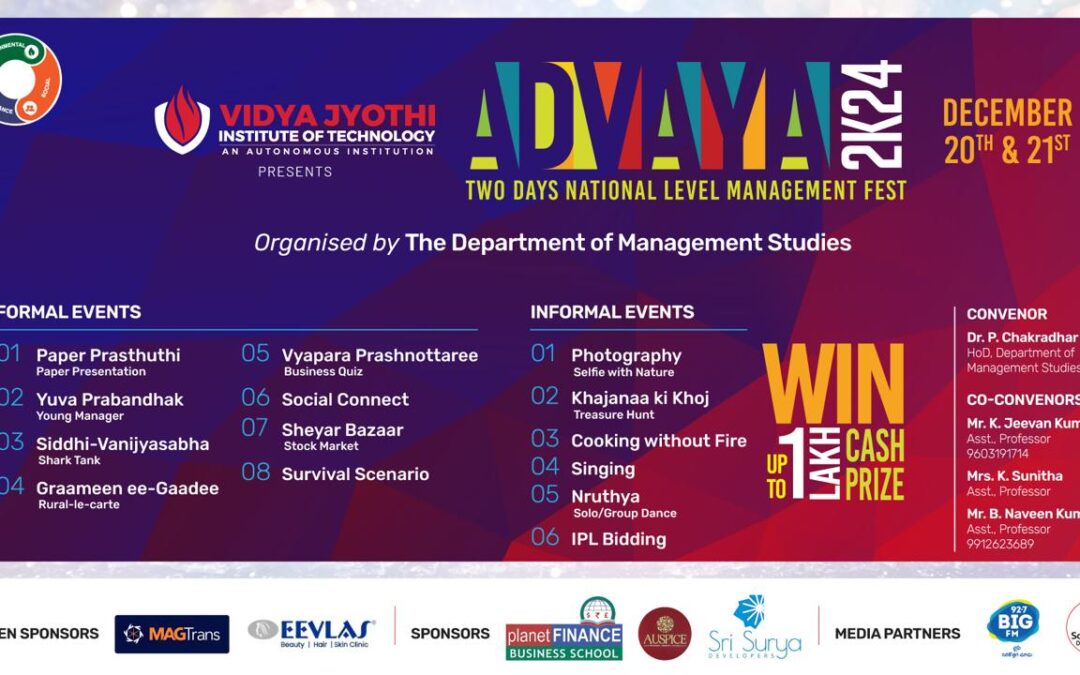
ADVAYA 2K24
ADVAYA 2K24: A National-Level Management Fest VJIT proudly announces ADVAYA 2K24, a national-level management fest...
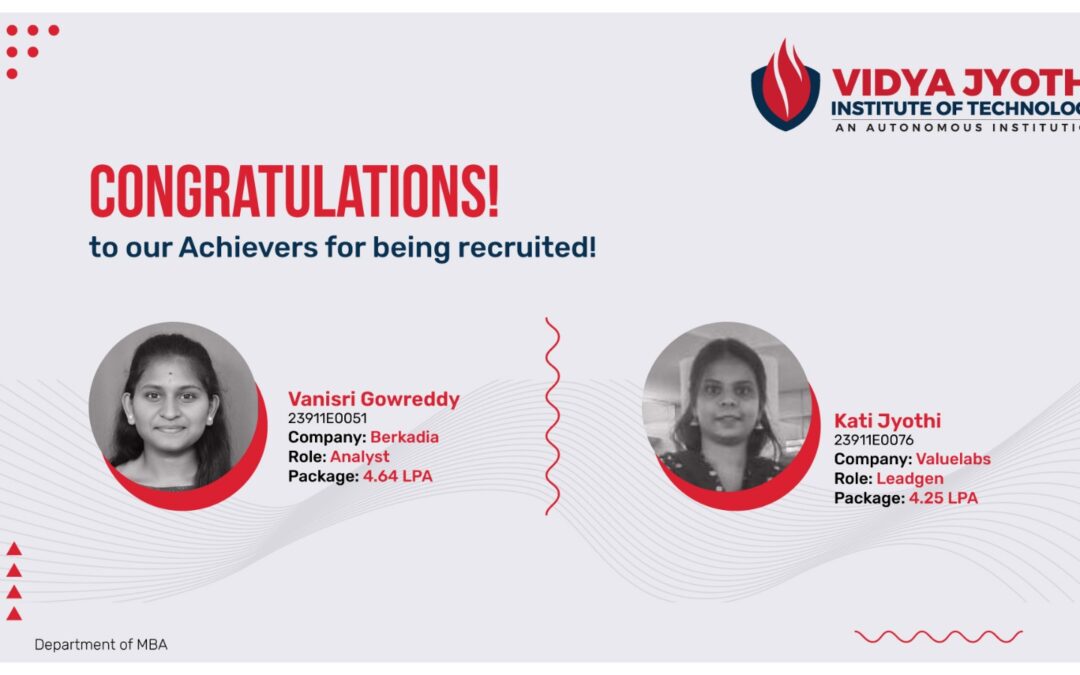
Congratulations to Our MBA Achievers!
The Department of MBA is proud to celebrate the outstanding achievements of our talented students! Vanisri...
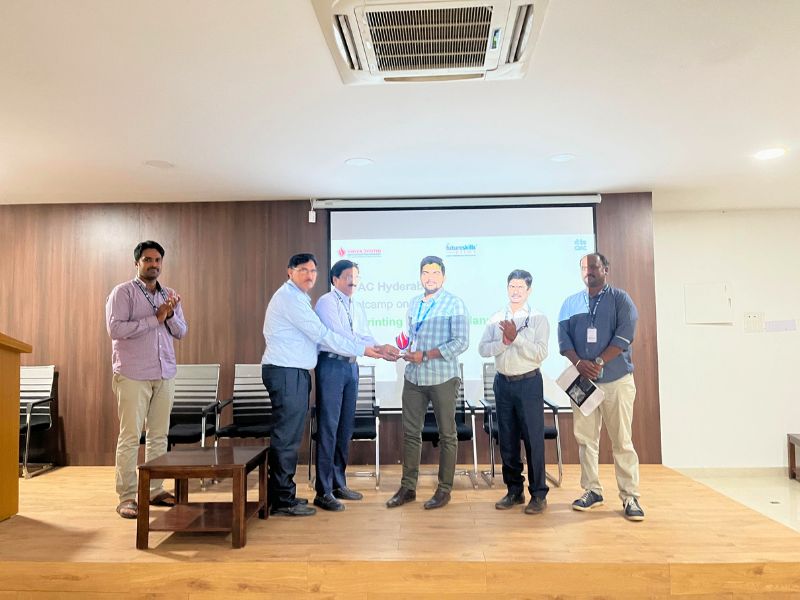
A 5-day bootcamp on 3D Printing and CAD Modelling
At Vidya Jyothi Institute of Technology, we take pride in hosting transformative learning opportunities for our...
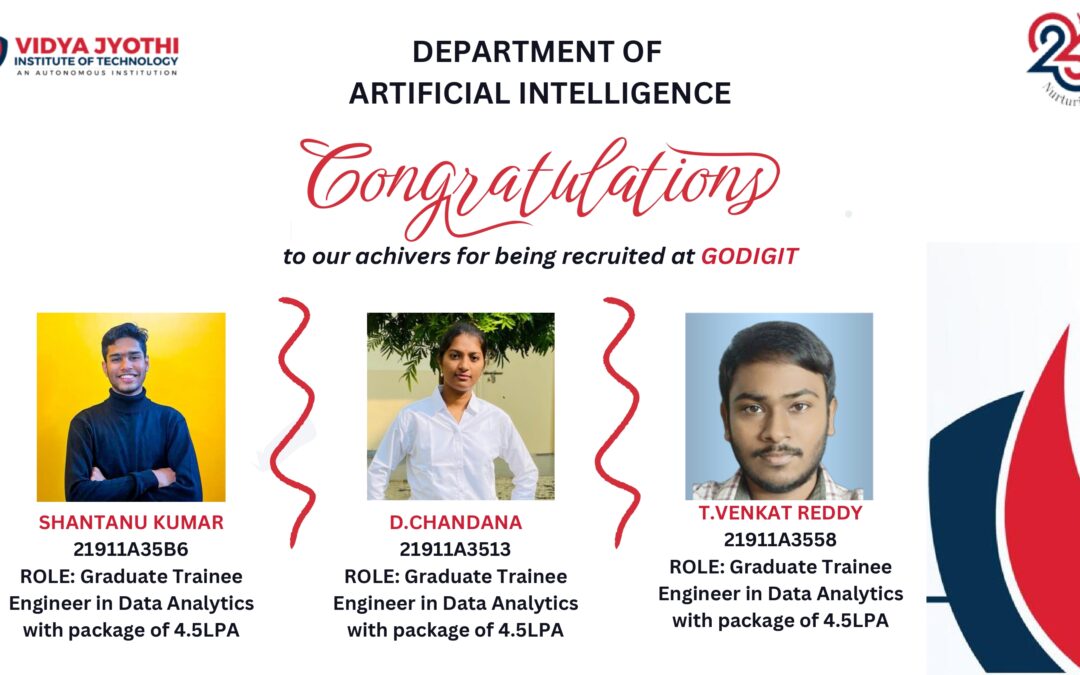
Congratulations to GoDigit Selects
Hearty Congratulations to the students from the Department of Artificial Intelligence for their outstanding...
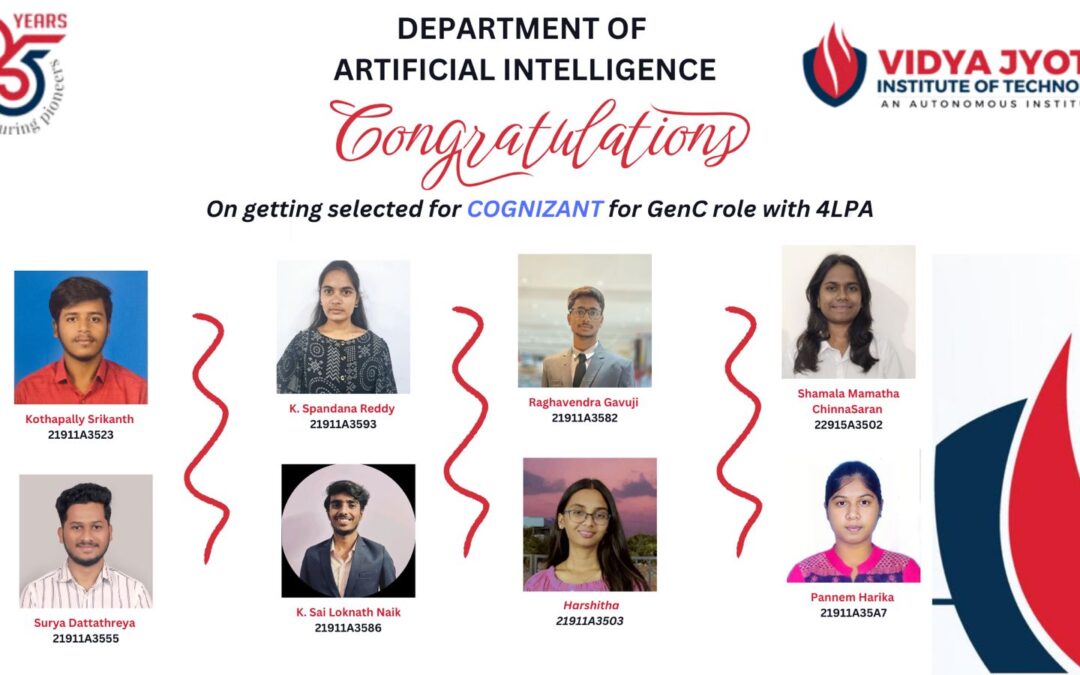
Congratulations to Cognizant Selects
We are delighted to announce the outstanding achievement of our students from the Department of Artificial...
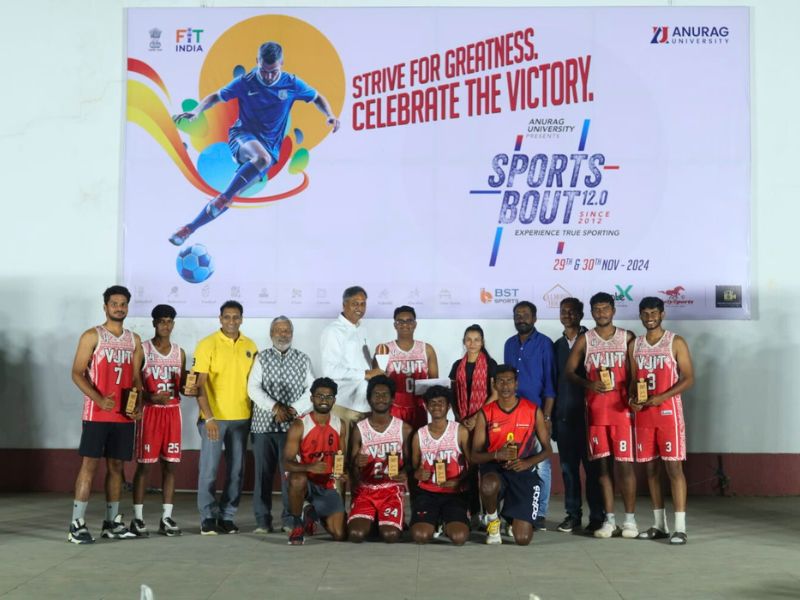
Achievements at SPORT’S BOUT
We are proud to announce the exceptional achievements of our teams at SPORT'S BOUT 12.O, a National Level...
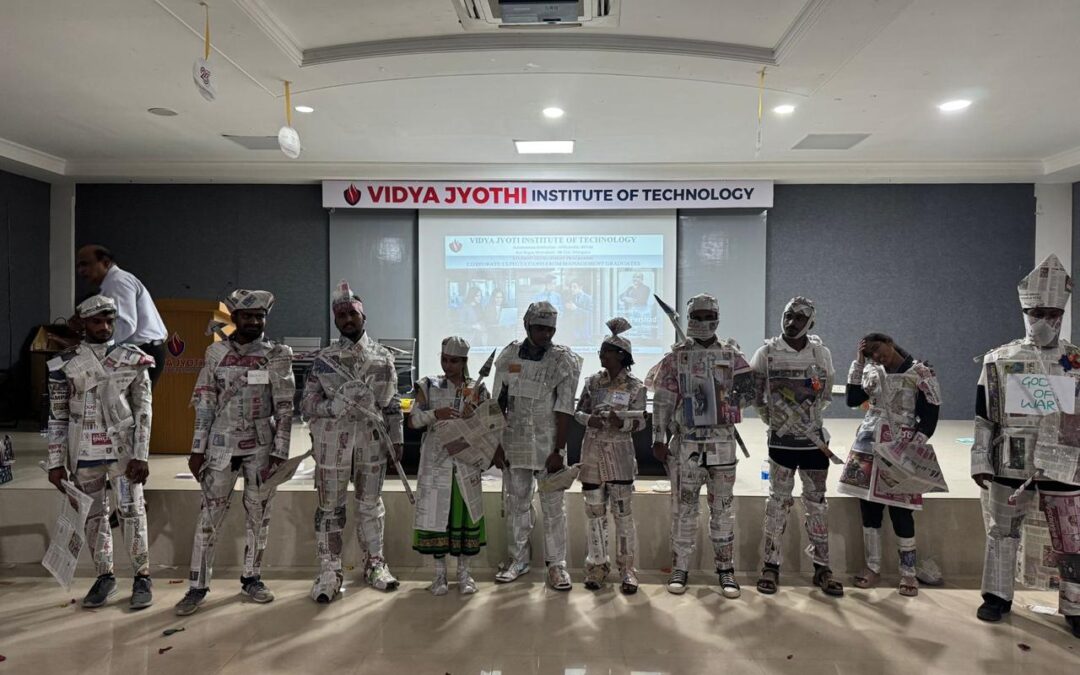
Workshop on Corporate Expectations from Management Graduates
Date: 23rd November 2024No. of Participants: 105 Summary of the Event The Department of Management Studies organized a...
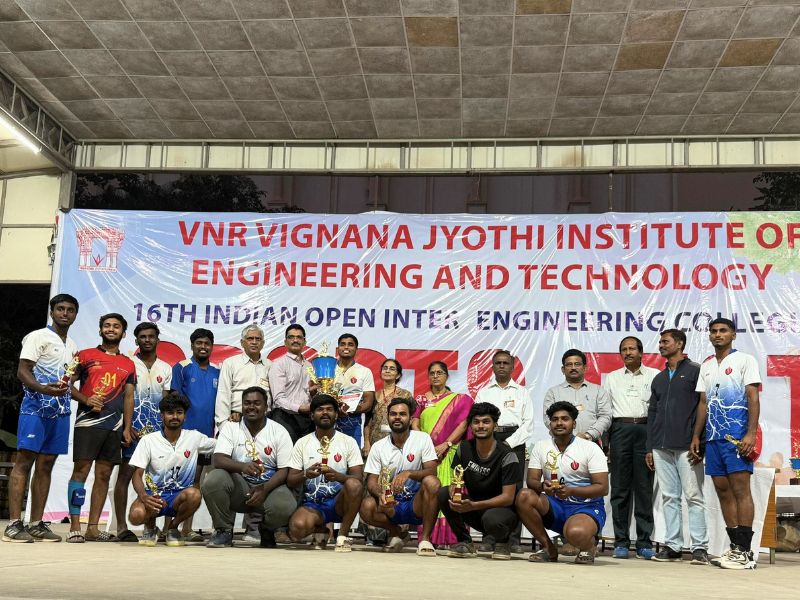
Victory for VJIT Volleyball Team
Our Men’s Volleyball Team emerged as Champions at the 16th Indian Open National Level Inter-Collegiate Sports Fest!...
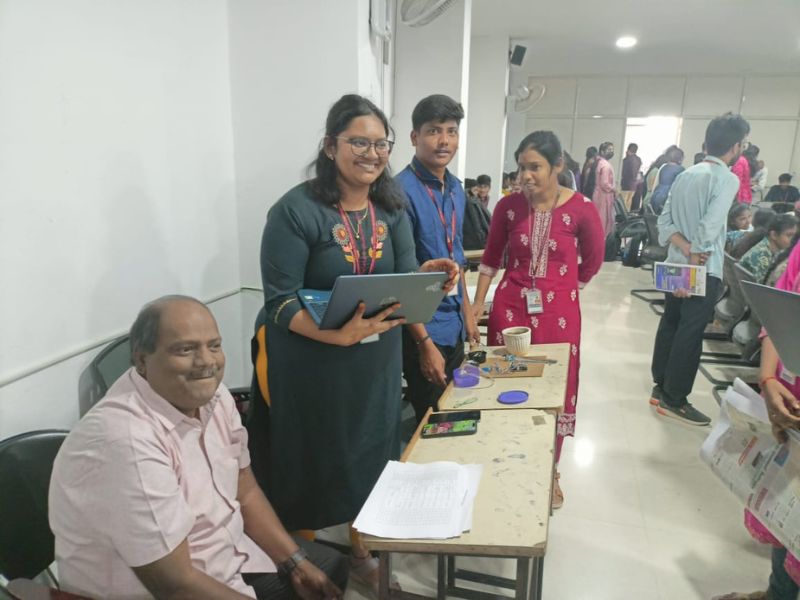
Project Expo 2024 – Showcasing Innovation and Creativity
The Department of Computer Science and Engineering (CSE) organized a Project Expo on 19th November 2024, providing a...
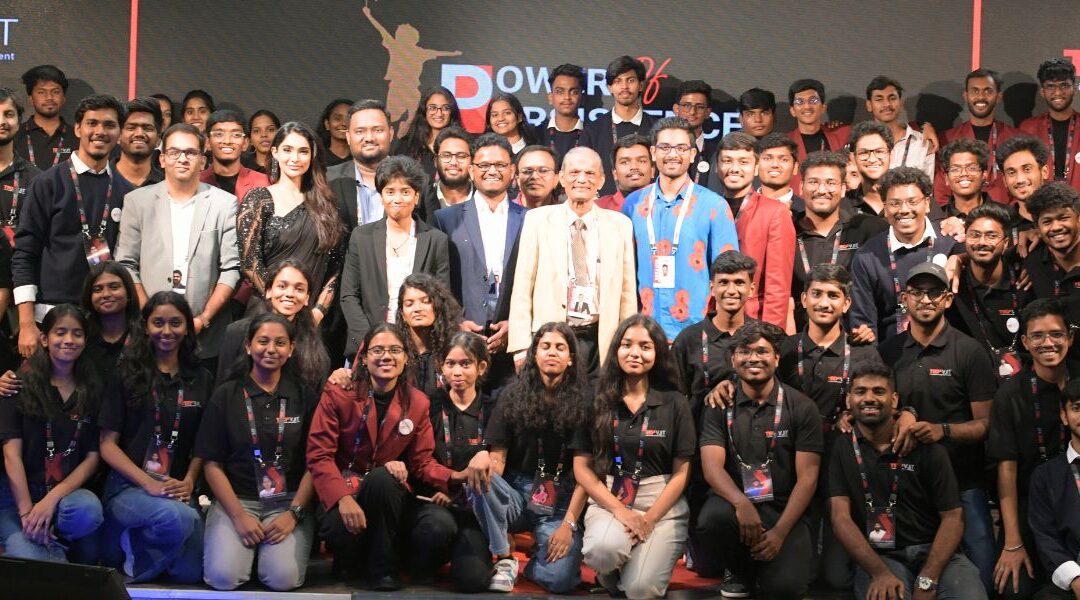
TEDxVJIT: A Landmark Event Celebrating the Power of Persistence
Event Overview Vidya Jyothi Institute of Technology (VJIT) recently marked a significant milestone with its first-ever...
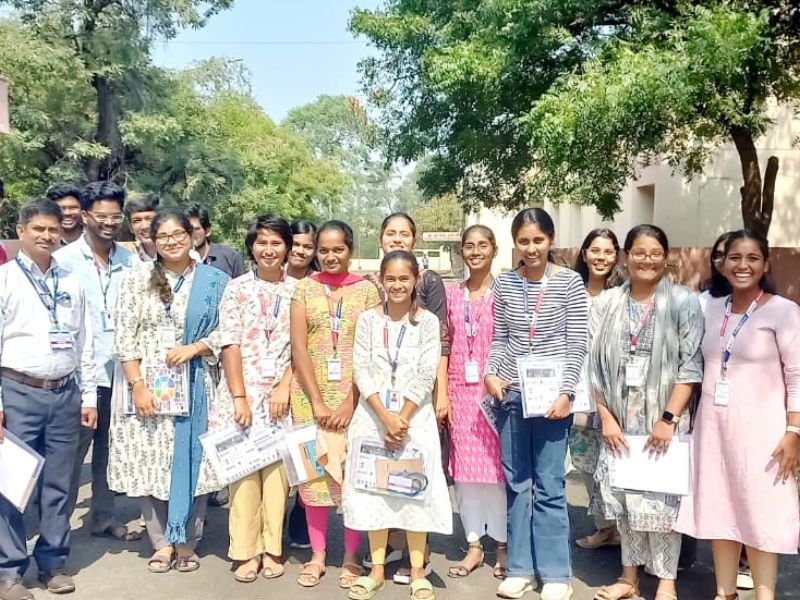
VJIT 1st-Year Students Explore Cutting-Edge Technologies at ARCI, Hyderabad
On 7th November 2024, first-year students from Vidya Jyothi Institute of Technology (VJIT) attended an insightful...
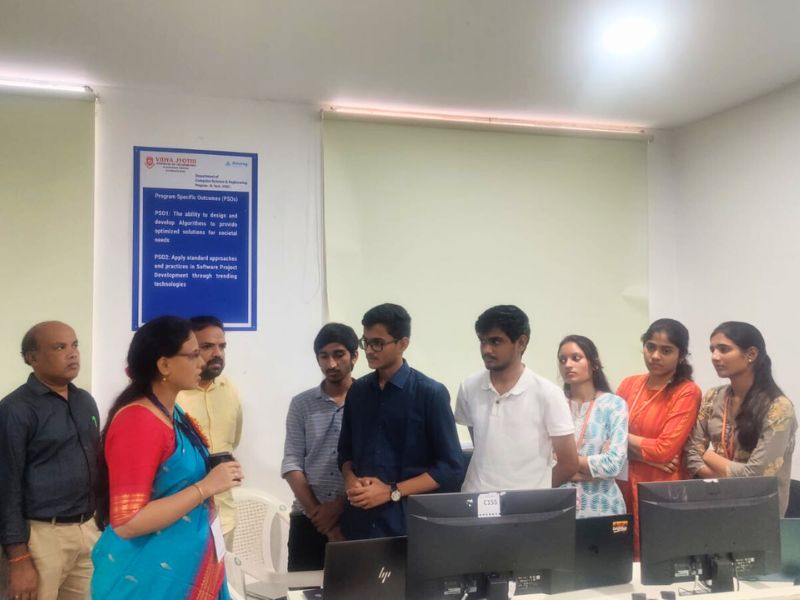
Data Dive Datathon – Exploring the Power of Data
The Department of Computer Science and Engineering, VJIT, Hyderabad, hosted an engaging event, “Data Dive Datathon,”...
Professional Bodies & Clubs
Professional Bodies
- CSI
- ISTE
- ACM Chapter
- Google Development Society
- IEEE-CS Chapter
- IUCEE IASF-chapter
Clubs
- Coding Club
- Machine Learning Club
- Data Science Club
- Gaming Club
- IoT Club
- Robotics Club
- Drone Club
- Deep Learning Club
Industry & Academic Collaborations
Other Information
The AI Dept itself and the H&S Dept organizes different activities for the enhancement of the knowledge of the students and to improve their Life Skills, Soft Skills and Technical Skills. The different activities are –
- Guest Lectures
- Coding contest
- Science Project Exhibition
- Software Project Exhibition
- Poster Exhibition
- Special Classes on Coding at evening hrs for doubt clearance
- Online classes during off days and All India Lockdown Days
- Online test on different subjects
- Quiz
- Seminar by the students
- Value added courses
- Certifications
Value Added Courses
- AWS Cloud Literacy Course
- MOOC on “C and Data Structures”
- CISCO Networking Course
- Machine Learning MOOC at Coursera.org
- CS50X MOOC by Harvard University at edx.org
- Python MOOC at Udemy.com
- Ethical Hacking MOOC at Udemy.com
- “C Programming” at Udemy.com
- Cognizia A
- Microsoft Azure
Resources
Teaching & Learning
Innovative Teaching Techniques
Teaching is an art and science. Teaching is a process of imparting knowledge and skills. It is a systematic process based on some educational objectives to communicate.
The following innovative teaching methods are being adopted:
Interactive Learning
Interactive learning can take many different forms. Students strengthen their critical thinking and problem-solving skills using a much more holistic approach to learning. Interactive learning can take place across the curriculum with technology.
Collaborative Learning
“Collaborative learning is an umbrella term for a variety of educational approaches involving joint intellectual effort by students, or students and teachers together. Usually students are working in groups of two or more, mutually searching for understanding, solutions or meanings, or creating a product.
Collaborative learning activities vary widely, but most center on students’ exploration or application of the course material, not simply the teacher’s presentation or explication of it”.
Why use cooperative learning? To..
- promote student learning and academic achievement
- enhance student satisfaction with their learning experience
- help students develop skills in oral communication
- develop students skills
- promote student self-esteem
5 Elements of cooperative learning
- Positive interdependence
- Face-to-face interaction
- Individual and group accountability
- Interpersonal and small group skills
- Group processing
Flipped Classroom
A flipped classroom is an instructional strategy and a type of blended learning that reverses the traditional learning environment by delivering instructional content, often online, outside of the classroom. It moves activities, including those that may have traditionally been considered homework, into the classroom. In a flipped classroom, students watch online lectures, collaborate in online discussions, or carry out research at home and engage in concepts in the classroom with the guidance of a mentor.
The flipped classroom intentionally shifts instruction to a learner-centered model in which class time explores topics in greater depth and creates meaningful learning opportunities, while educational technologies such as online videos are used to ‘deliver content’ outside of the classroom. In a flipped classroom, ‘content delivery’ may take a variety of forms.
Role Play
Role-playing is the changing of one’s behavior to assume a role, either unconsciously to fill a social role, or consciously to act out an adopted role.
- To refer to the playing of roles generally such as in a theatre, or educational setting;
- To refer to taking a role of an existing character or person and acting it out with a partner taking someone else’s role, often involving different genres of practice.
Think-Pair-Share
Think-Pair-Share (TPS) is a collaborative learning strategy in which students work together to solve a problem or answer a question about an assigned reading. This technique requires students to (1) think individually about a topic or answer to a question; and (2) share ideas with classmates. Discussing an answer with a partner serves to maximize participation, focus attention and engage students in comprehending the reading material.
Benefits:
- The Think-Pair-Share strategy is a versatile and simple technique for improving students’ reading comprehension.
- It gives students time to think about an answer and activates prior knowledge.
- TPS enhances students’ oral communication skills as they discuss their ideas with one another.
- This strategy helps students become active participants in learning and can include writing as a way of organizing thoughts generated from discussions.
Case Based Learning
This method is learner-centered with intense interaction between participants as they build their knowledge and work together as a group to examine the case
The instructor’s role is to facilitate the students collaboratively analyze and address problems and resolve questions
Interactive Learning
Interactive Learning is a hands-on, real-world approach to education ‘Inetractive learning actively engages the students in wrestling with the material
It reinvigorates the classroom for both students and faculty. Lectures are changed into discussion and students and teachers become partners in the journey of knowledge acquisition
Students strengthen their critical thinking and problem-solving skills using a much more holistic approach to learning
Open Educational Resources
Open educational resources (OER) are freely accessible, openly licensed documents and media that are useful for teaching, learning, and research resources that reside in the public domain or have been released under an intellectual property license that permits their free use and re-purposing by others.
Open educational resources include full courses, course materials, modules, textbooks, streaming videos, tests, software, and any other tools, materials, or techniques used to support access to knowledge.
Like Blog, MOOC(Massive Open Online Course), Moodle etc.
Teaching & Learning methodologies
| Faculty Name | Subject | Topic | Innovative methods adopted | Preparation |
| Dr.A.Obulesh | MFCS | Logic | Prolog is sued to show Logic execution | The online tool to execute Prolog is shown and demo is given. Student are given problem to solve. Interactive Online Tool is used : https://swish.swi-prolog.org/ |
| Dr.A.Obulesh | MFCS | WFF : Well Formed Formula | Student’s Seminar | Students have been given real life problems to derive WWF |
| Dr.A.Obulesh | AI | AI Algorithms | AWS Classroom | Students should be good in basic AI algorithms. |
| Kandula Neha | CDS | Programming (Arrays, Stacks, Queues) | Hacker Rank | Students should be good at basic Algorithms and Syntax of concepts |
| Kandula Neha | CDS | Algorithms and logics | Innovative Mini Projects | Students should explain with real life examples |
| K.Kalyani | CL | Cyber Crimes | Students Seminar | Students should explain with real life example cases |
| K.Kalyani | CL | IT Act 2000 | Innovative quiz | Well preparation about IT act 2000 |
| Dr.A.Obulesh | Robotics | Robotics lab | Case Studies | Students should explain with real life examples |
| Ch.Swetha | Concepts of DataStructures through C++ | Trees and Graphs Algorithms | Mini Projects | Students should explain with real life examples |
| D.Vaman Ravi Prasad | MFCS | Pigeon Hole Principle | Poster Presentation | Students should explain Poster with the given topic |
Curriculum
Research & Development
Overview
The Dept of Artificial Intelligence is presently working in the following fields of research.
- Data Analytics
- Data Engineering
- Data Science
- Machine Learning
- Artificial Intelligence
- Coding in AI, M, DS and DL – Python, R, Octave etc.
Publications
Roll of Honors
Toppers – Batch Wise
Toppers – Semester Wise
Contact Us
Mr. G. Srinivasa Rao
Professor, HOD
[email protected]

